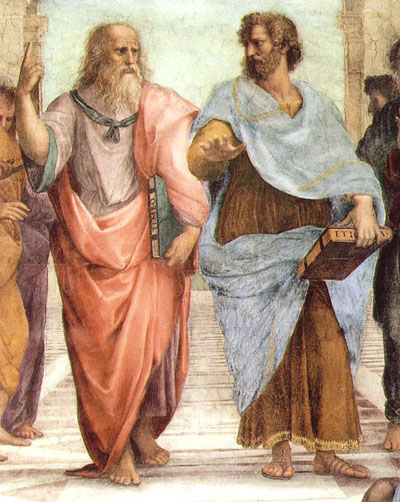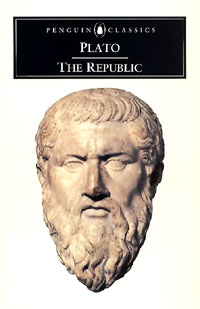
Raphael, "School of Athens" (Detail of Plato & Aristotle) 1511
Vatican Palace, Rome
platonism

Raphael, "School of Athens" (Detail of Plato & Aristotle) 1511
Vatican Palace, Rome
The philosopher Plato (left above with his student Aristotle) did not write
views under his own name (his writings are mainly in the form of conversations called 'Dialogues',
between Socrates and other Greek philosophers of
the fifth century B.C.). Nevertheless certain
views are attributed to Plato as being his own.
Many classical theories assume that if we know what good is we will naturally act to try to achieve it.
If we can discover what is right, Plato believes, we will never act wickedly. Evil is due to lack of knowledge.
Do you think this is true? Give reasons for your answer.
But the problem is to discover what is right, or as Plato
called it, 'the good'. How can this be done when we
differ so greatly in our opinions about the good life?
Plato's answer is that finding the nature of the good
life is an intellectual task similar to the discovery
of mathematical truths. Just as the latter cannot be
discovered by untrained people, so the former
cannot be either.
In order to discover what the good life is we must first
acquire certain kinds of knowledge. Such knowledge can
be arrived at only if we are carefully schooled in
various disciplines, such as mathematics, philosophy,
and so on. Only when we have been through the long
period of intellectual training that Plato suggested,
would we have the capacity to know the nature of
the good life.
lt is important for an understanding of Plato to make
a distinction at this point. Plato did not maintain that
we must have knowledge in order to lead the good life.
He maintained the weaker doctrine that if we
did have knowledge we would lead the good life.
Even without the possession of knowledge it is
possible for some people to lead the good life,
but they will do so haphazardly or blindly.
It is only if we have knowledge that we can be
assured of leading such an existence.
This is why Plato believed that we must be instructed in
two different ways. We must develop, on the one hand,
virtuous habits of behaviour, and on the other,
we must develop our mental powers through the
study of such disciplines as mathematics and
philosophy. Both of these types of instruction are
necessary.
First, some of us may not have the intellectual
capacity to get knowledge. But if we are guided by
those people who have knowledge of the good, and who
accordingly act virtuously, we, too, will act virtuously
even though we do not understand the essential nature
of the good life.
On the basis of this sort of reasoning, Plato went on to
advocate the neccssity of censorship in what he called an
'ideal society' - the society which is portrayed in his
famous book, The Republic.
Plato felt that it was
necessary to prevent young people from being exposed to
certain sorts of experiences if they were to develop
virtuous habits & thus lead the good life. Secondly,
it was necessary for some people to
develop their mental powers & undergo
rigorous intellectual training which will do more than develop virtuous habits.
These exceptional people, Plato thought, must finally be the rulers of
the ideal society. In such a society, the rulers, having
developed their intellectual capacities, would also
have acquired knowledge. And having acquired knowledge
they would understand the nature of the good life.
This would guarantee their acting rightly or morally,
& hence would ensure their being good rulers. For,
as we have seen, it was Plato's belief that if we can
acquire knowledge, in particular knowledge of what
was good, then we would never act evilly.
A second basic element in Plato's philosophy is
what modern scholars term his "absolutism".
According to Plato, there is fundamentally one
& only one good life for all people to lead.
This is because goodness is something which is
not dependent upon people's inclinations, desires,
wishes, or upon their opinions. Goodness in this
respect resembles the mathematical truth that
two plus two equal four. This is a truth which is
absolute; it exists whether anyone likes such a
fact or not, or even whether s/he knows mathematics
or not. It is not dependent upon our opinions
about the nature of mathematics or the world.
This can be put in another way. Plato is arguing
for the objectivity of moral principles as opposed
to other philosophies which contend that morality is
merely a "matter of opinion" or "preference". It is
an absolute]y objective moral law that "Thou Shalt
Not Commit Murder".
Platonism had a tremendous impact upon religious
philosophy. Most theologians believ that
moral laws such as "Thou Shalt Not Steal", or "Thou
Shalt Not Commit Murder" are absolute & objective
in the Platonic sense.
The development of Plato's philosophy (known as
Neo-Platonism) was the nearest Greek philosophy came
to itself becoming religion & had a direct influence
on the development of Christian theology. But it should
be pointed out that although Platonism & most theologies
agree in contending that moral standards are objective,
there is a basic difference between them. Plato himself
believed that moral standards were superior even to God,
& God is good if & only if s/he acts in accordance with
such a standard. This is very different from the
Judaeo-Christian view that God creates goodness.
criticisms of platonism
As we have seen, Platonism as a moral philosophy rests
upon two basic assumptions. One is the assumption that
if a man has knowledge of the good life, he will never knowingly act
immorally. The other is that there is one & only one good
life for all humans; just as there is no moral alternative to
the command: "Thou Shalt Not Steal".
Most philosophers who criticize Plato have interpreted this
as expressing a psychological judgment about how we act
under certain conditions. The conditions are that if we have
a certain kind of knowledge, we will behave in a certain way.
Interpreted as a psychological account of how we behave
in every case, the theory seems to have problems. For
some of us may well understand that stealing is wrong
(for example) but we may still persist in stealing.
Plato would say of such people that they really do not
understand what is meant by "stealing" since no-one
willingly will do what they know to be wrong. But if we
talk to such people & if they give the usual signs of
understanding what it means to steal, and further,
if they admit it to be morally wrong but still steal,
it appears as if Plato's account must be rejected, since
it seems that some of us will act wrongly while knowing
what the right course of action is. This was the view
of human nature taken by Aristotle.
But what makes Plato's account attractive is that it
attempts to supply a general solution to a common type
of difficulty which arises in daily life. We often find
ourselves in situations where we do not know how to
behave because we do not know what the right course
of action would be in those circumstances. Is it right
to defend my country if this means killing someone,
or is it right never to kill anyone?
What Plato suggests is that if we had more information,
if we had been more carefully trained, we could discover
the answer. We would know what the right course of action
would be in those circumstances & thus our perplexity
would be relieved. The situation seems analogous to many
problems which a doctor faces: Should he operate now or
wait until tomorrow? Should he administer this drug or
not? These are problems which would be hopelessly difficult
to the average person since s/he does not have the training
& hence the knowledge to solve them. But to a trained
person, the difficulty is reduced or overcome.
Plato's point is that moral difficulties are often
theoretically solvable by the gaining of further knowledge -
and this is a point of view which cannot be lightly dismissed.
The major objection to it, however, is this. Moral problems
are not the same as scientific questions. When all the relevant
facts have been gathered in a scientific issue, we can in
principle always decide the issue. But this is not so in a moral
situation. We may know all the relevant facts in a given situation.
We may know, for instance, that the effect of dropping a bomb on
a certain area will be to kill 1,000 people, and, on the other hand,
we may also know that if we drop the bomb, a disastrous war will
be shortened. But our perplexity still exists. Should we or should
we not drop the bomb? Although the acquisition of further
information about a situation will solve some difficulties we have
about acting in that situation, this is not always so. Platonism
cannot be accepted without considerable qualification. Moral
knowledge is not analogous to scientific or mathematical
knowledge & Plato's mistake was to think that it is.
A further criticism that arises from this is that, since Plato
regards morality as being a matter of knowledge, he almost
excludes the possibility of fully moral behaviour for all but a
few intellectually gifted people. It is not sufficient to say that
those of us who do not have this ability can live good lives by
allowing ourselves to be ruled by those who have,
since to behave morally presupposes that one has responsibility
for one's actions. An action is not truly moral (or immoral) unless
it is the result of the free choice of the individual performing it.
To make this choice the individual needs the kind of moral
understanding that Plato says is possible only for a few.
Again, we shall find Aristotle shows a clearer awareness
of this basic feature of moral behaviour than Plato.
The second basic assumption of Platonism is that there is one
and only one right course of action for all people - this is
his "absolutism". Even in ancient times this view was strongly
criticized, again by Plato's greatest pupil,
Aristotle. Aristotle's moral philosophy rejects Platonic
ideas that there is one & only one right course of action
in a given moral situation, that good behaviour is not possible
without moral understanding, and that knowledge of the
good will necessarily lead to virtuous behaviour.

